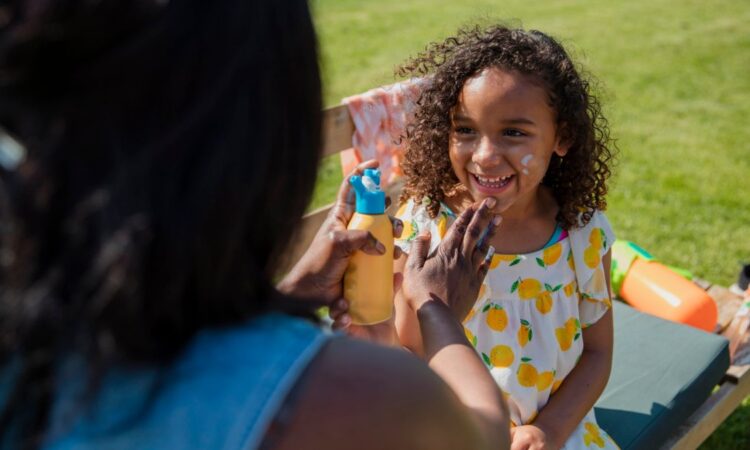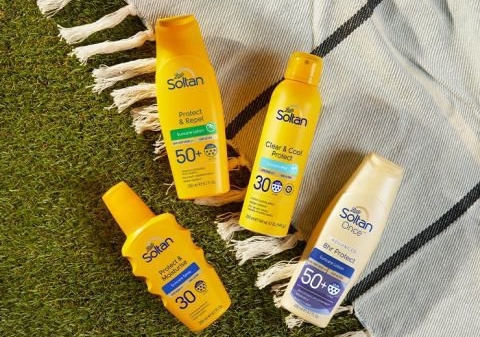Hygiene banks race to stock sunscreen for families who cannot afford sun protection in cost of living crisis

Hygiene banks are trying to stock their shelves with suncream before summer over fears families will be unable to afford to protect their skin.
Pressure is piling on the Government to remove VAT from high-factor sunscreen products to ensure the public can afford what campaigners call a “critical form of protection from the sun’s harmful UV rays”. Dermatology experts say it is a “common-sense” policy.
Half of UK adults think sunscreen is too expensive and 10 per cent do not use it because of the cost, leaving people at risk of developing preventable skin cancer, according to the charity Melanoma Focus.
Own-brand sunscreen on the high street typically starts from around £3 a bottle. But hygiene poverty – the inability to afford products to keep clean, or essential toileteries – is increasing amid the cost of living crisis.
The Hygiene Bank, which supports 344 food banks and 480 schools with free hygiene products, is asking sun protection brands “to get in touch as we are expecting need to be exceptionally high this year”.
Helen Patel, media associate at The Hygiene Bank, told i: “The Trussell Trust just confirmed that 760,000 people visited a food bank in their network for the first time last year. Our research shows that people cut back on hygiene basics before food, so the chances are that these visitors are all experiencing hygiene poverty and unable to access sun protection.
“For many families, we may be their only source of sun protection. Key to us is getting product to vulnerable families in schools before the summer break.”
How much is sunscreen?
Soltan SPF50+ 200ml from Boots: £4.45
Garnier Ambre Solaire SPF50+ 200ml from Boots: £5
Solait SPF50 200ml from Superdrug: £4.99
Nivea SPF50+ 200ml from Superdrug: £5.99
Piz Buin SPF50+ 200ml from Sainsbury’s: £6.50
Sun Protect SPF50+ 200ml from Sainsbury’s: £4.50
Soleil SPF50+ 200ml from Tesco: £2.80
Charity Melanoma Focus, in a survey of 2,000 people, found 67 per cent would use suncream more if it was 20 per cent cheaper – the equivalent of making it VAT-free.
While nearly 90 per cent of respondents put sunscreen on their children in the summer, some of those who did not regularly cited the high cost of the product.
The charity pointed out that skin cancer affects people from all economic backgrounds, but around 4,000 cases of melanoma in England each year were linked with deprivation, increasing to around 25,000 when including non-melanoma skin cancer cases.
Melanoma is caused by ultraviolet (UV) light from the sun and sunbeds, and it can spread to other parts of the body. Cases are on the rise, with 2,300 melanoma skin cancer deaths in the UK every year.
Cancer Research UK said that in addition to using sunscreen, spending time in the shade and covering up were the best ways for people to protect themselves.
Susanna Daniels, CEO of Melanoma Focus, said: “Melanoma is the fifth most common cancer in the UK and the deadliest form of skin cancer. Eighty-six per cent of melanomas are preventable and, therefore, wearing a high SPF [sun protection factor] sunscreen is a hugely important safety measure for protecting against it.
“We know that people are experiencing increasing pressures on their finances at the moment but, with skin cancer rates on the rise, the use of sunscreen should be a high priority.
“The Government could help make skin protection more accessible to all, regardless of income level by removing VAT from high-factor sunscreens. This would be a cost-effective way to cut the overall incidence of skin cancer and could help save lives.”
Amy Callaghan, SNP MP for East Dunbartonshire, is campaigning to remove VAT on sunscreen products of SPF30 or more. She said: “More people wearing sunscreen means fewer people getting melanoma. But when 52 per cent of people in my constituency can’t afford to turn on the heating, it’s unlikely they’ll take on extra expenses like sunscreen.
“That’s why we must make sunscreen more affordable by removing VAT.”
Dr Bav Shergill, chair of the British Association of Dermatologists’ Skin Cancer Prevention Group, said rising skin cancer rates took an enormous toll on sufferers but also cost the NHS a huge amount of money to treat.
“The Government should be doing everything in its power to get to grips with this issue,” he said. “Given the cost of living crisis, making sunscreen cheaper to encourage people to protect their skin is a common-sense policy which would bring us into line with other countries with high rates of skin cancer.
He added: “We are fortunate that some supermarkets have stepped in to reduce the cost of sunscreens and that individual charities are doing great work to raise awareness about skin cancer prevention. However, the lack of action from the Government is noticeable.”
The Treasury said: “We recognise the impact that rising prices are having at home which is why we are providing significant support worth on average £3,300 per household. This includes holding down energy bills, uplifting benefits and delivering direct cash payments.
“High-factor sunscreen is on the NHS prescription list for certain conditions and is already provided VAT-free when dispensed by a pharmacist to these patients.”






